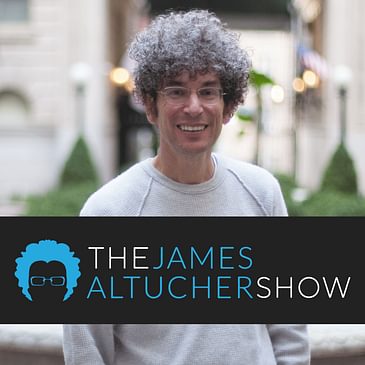A Note from James:
Oh my gosh, I've been wanting to have this guy on my podcast for literally ten years, ever since I started. I am so impressed with him, and he speaks about a subject near and dear to my heart. Salman Khan, Sal Khan, is the creator of Khan Academy, which was really the first big online academy. It focused on teaching math, coding, and other subjects, effectively reaching people who went through years of school without truly mastering these topics. Khan Academy has had a profound understanding of education and has become a huge phenomenon.
150 million students have used Khan Academy, with that number representing monthly users or registered accounts. Sal Khan recently authored a book on how AI will revolutionize education, titled "Brave New Words: How AI Will Revolutionize Education and Why That's a Good Thing." He discusses the use of AI in education for students, teachers, and employers, providing valuable insights into not only education but also AI and its impact on our lives. He addresses common fears about AI, its role in creativity, learning, and whether it will replace jobs or facilitate new employment opportunities.
I finally got the chance to interview Sal Khan about Khan Academy and AI. I learned so much, and I hope you will too.
Episode Description:
In this thought-provoking episode of The James Altucher Show, we embark on an exploratory journey into the future of education with none other than Salman Khan, the visionary founder of Khan Academy. As AI continues to seep into every facet of our lives, its potential to transform educational paradigms stands both as an opportunity and a profound challenge. Salman shares intriguing insights from his latest book, *Brave New Words: How AI Will Revolutionize Education and Why That's a Good Thing*, delving into AI's role not just as a disruptor, but as a potent catalyst for educational equity and innovation.
Salman's perspective is not just about theoretical possibilities; it's grounded in the tangible impact Khan Academy has had on democratizing education for millions globally. He recounts the Academy's genesis from humble beginnings — a series of YouTube tutorials for his cousin — to a global phenomenon. What stands out is his belief in AI's potential to further this mission, tailoring learning experiences to meet individual student's needs and inspiring both educators and learners to view AI as a partner, rather than a threat.
This episode is a beacon of optimism for educators, parents, and creatives alike, providing nuanced viewpoints on AI's implementation in classrooms, its potential to reshape content creation, and the critical role of humans in steering this technological revolution. Salman envisions a future where AI supports personalized learning journeys, making the exceptional accessible to many rather than a privileged few.
James engages Salman in discussions that span the philosophical to the practical, from concerns over AI-induced job displacement to the future of screenwriting in the age of algorithmic creativity. Yet, at its core, this dialogue returns always to the transformative potential of AI in enriching human understanding and connection — whether in interpreting Shakespeare or solving quadratic equations.
If you're looking for a blend of futurism with grounded optimism or curious about how technology could enhance human capabilities rather than replace them, this episode is an enlightening listen. As always, James brings his signature mix of curiosity and skepticism, pushing beyond surface-level concerns to uncover the deeper implications of our evolving relationship with AI. Listen in to reimagine what education could become in an AI-integrated world, and perhaps to catch a glimpse of how we might navigate these uncharted waters with wisdom and humanity at the helm.
Episode Summary:
00:00 Introduction to the Podcast and Sal Khan's Impact
03:00 Exploring Sal Khan's Personal Background
05:12 The Genesis of Khan Academy
08:26 Transitioning Khan Academy into a Nonprofit Giant
09:53 AI's Role in Revolutionizing Education
12:45 Addressing AI and Cheating in Education
16:03 The Future of Education and AI's Collaborative Potential
24:24 Reimagining the Role of Teachers in an AI-Enhanced World
29:43 Rethinking Education Systems for the Future
34:56 Personalized Learning and AI's Role
40:50 AI's Role in Education: Enhancing Teacher and Student Experiences
43:05 The Future of Education: Trends and AI Integration
44:37 Revolutionizing Assessments and Personalized Learning with AI
54:25 Addressing the Creative Industry's Concerns About AI
01:01:42 Parenting in the Age of AI: Opportunities and Challenges
01:15:34 The Future of Education Credentials and Access
01:20:26 Concluding Thoughts on AI's Impact on Education
Links and Resources:
- "Brave New Words: How AI Will Revolutionize Education and Why That's a Good Thing" by Salman Khan and Other Creators - For more information on the book: https://www.amazon.com/Brave-New-Words-Revolutionize-Education/dp/1119824848
- Khan Academy - A nonprofit educational organization offering free courses on a wide array of subjects: https://www.khanacademy.org
- OpenAI and ChatGPT - Creators of the Generative Pre-trained Transformer AI models: https://openai.com
- Tyler Perry - Filmmaker discussing the impact of AI on his industry decisions: https://tylerperry.com
- Duke TIP (Talent Identification Program) - An example of advanced learning programs for youth: https://tip.duke.edu
------------
- What do YOU think of the show? Head to JamesAltucherShow.com/listeners and fill out a short survey that will help us better tailor the podcast to our audience!
- Are you interested in getting direct answers from James about your question on a podcast? Go to JamesAltucherShow.com/AskAltucher and send in your questions to be answered on the air!
------------
- Visit Notepd.com to read our idea lists & sign up to create your own!
- My new book, Skip the Line, is out! Make sure you get a copy wherever books are sold!
- Join the You Should Run for President 2.0 Facebook Group, where we discuss why you should run for President.
- I write about all my podcasts! Check out the full post and learn what I learned at jamesaltuchershow.com
------------
Thank you so much for listening! If you like this episode, please rate, review, and subscribe to “The James Altucher Show” wherever you get your podcasts:
Follow me on social media:




